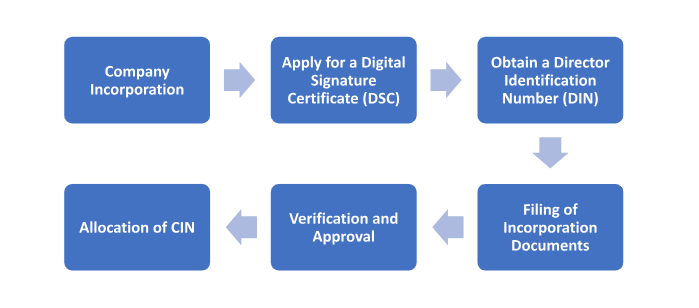How to Get a Company Registration Number or CIN in India
- November 1, 2023
- Start and manage a business

In India, obtaining a Company Registration Number (CRN) or Corporate Identification Number (CIN) is required for establishing a firm. The CIN is a unique identity provided by the Ministry of Corporate Affairs (MCA) that ensures legal recognition and aids in regulatory compliance. It functions similarly to a business’s identification card, validating its existence and allowing authorities and stakeholders to access information about its structure, operations, and financial position. You can search for this CIN number for proprietorship on the MCA’s website. How to get CIN number entails a methodical registration process with the MCA, stressing the importance of regulatory compliance in the Indian corporate scene.
Table of Contents
Overview of Company Registration Number or CIN in India
The Company Registration Number (CIN) is a unique identifying number provided to firms in India that are established under the Companies Act, 2013. It is an important identifier for tracking and maintaining the database of registered companies.
Here are some important facts about the Company Registration Number (CIN) in India:
- Unique Identifier: Each firm in India is granted a unique CIN, which is a 21-digit alphanumeric identifier. The CIN structure comprises information such as the type of company, state of registration, year of organization, and registration number.
- Usage: The CIN is used for a variety of purposes, including legal and official documents, correspondence with authorities corporations, and any other operations-related activity.
- Public Information: The CIN is accessible in public domain and can be checked on the Ministry of Corporate Affairs (MCA) website.
- Legal Compliance: In India, all enterprises must display their CIN on official documents, letterheads, websites, and all correspondence. Companies must include their CIN on all business correspondence, invoices, and other official documents.
- Verification : Individuals can use the CIN to verify the details of a firm on the MCA’s website. Key information such as the company’s registered address, date of organization, status, and authorized capital are available to the public.
- Changes and Amendments: If the company’s registered data, such as its name, registered office, or status, change, the MCA must be updated, and a new CIN may be given to reflect these changes.
Role of Ministry of Corporate Affairs (MCA) in issuing CIN
When a company gets registered in India, the Ministry of Corporate Affairs (MCA) assigns it a Corporate Identity Number (CIN). The CIN acts as a unique identifier for registered firms, making distinguishing and monitoring easier. The MCA regulates company registration, maintains corporate registers such as the Registrar of Companies (RoC), ensures legal compliance, and protects investor interests. It develops and implements rules for good corporate governance, revising legislation on a regular basis to provide a favorable business environment. The CIN is critical in maintaining correct records, allowing MCA to efficiently monitor and govern the corporate sector.
Process of Acquiring a CIN
In India, acquiring a Corporate Identity Number (CIN) includes multiple processes, the most important of which is registering a corporation with the Ministry of Corporate Affairs (MCA). Here’s a high-level overview of the procedure:

- Company Incorporation: The primary stage is to pick one of these organization structure, consisting of a non-public restricted organization, a public limited organization, or a one-person employer, and to put together the relevant incorporation documents, which include the Memorandum of Association and Articles of Association.
- Apply for a Digital Signature Certificate (DSC): Directors and key stakeholders must receive a Digital Signature Certificate in order to file online filings with the MCA.
- Obtain a Director Identification Number (DIN): The business enterprise’s potential directors must apply for a Director Identification Number (DIN), which is a complete unique identification number granted by the MCA.
- Filing of Incorporation Documents: The next process is to submit the required documents to the Registrar of Companies (RoC), including the (MOA)Memorandum of Association, (AOA)Articles of Association, and other essential forms, together along with the prescribed fees.
- Verification and Approval: The RoC reviews the supplied documentation and, if all is in order, approves the incorporation application.
- Allocation of CIN: Following successful verification and approval, the RoC issues a Certificate of Incorporation, which includes the company’s unique Corporate Identity Number (CIN). This CIN is used to identify the company for legal and regulatory purposes.
Key Considerations for Obtaining a CIN
Key considerations for getting a Corporate Identity Number (CIN) in India include rigorous adherence to regulatory standards established by the Ministry of Corporate Affairs (MCA). This includes preparing and submitting the required papers, such as the Memorandum of Association, Articles of Association, and appropriate identity credentials. It is also critical to obtain a valid Digital Signature Certificate (DSC) for all directors or authorized signatories, as well as apply for a Director Identification Number (DIN) for proposed directors. To avoid any potential delays, a comprehensive investigation for the availability of a unique company name is required. Understanding statutory compliance, including tax requirements and company law provisions, and getting professional advice will help to shorten the process and ensure smooth and compliant operations for the newly formed firm.
Conclusion
Finally, the Corporate Identity Number (CIN) is an important identification for Indian businesses or companies that is assigned by the Ministry of Corporate Affairs (MCA) during the registration procedure. Following the mandated legal procedures, generating relevant documentation, obtaining or acquiring valid Digital Signature Certificates (DSCs) and Director Identification Numbers (DINs), and conducting extensive checks for unique company names are all crucial steps in obtaining a CIN. Businesses can streamline the registration process and establish a firm foundation for their operations by emphasizing compliance and seeking professional help, ensuring adherence to regulatory norms and supporting a smooth transfer into the corporate landscape.
CS Urvashi Jain is an associate member of the Institute of Company Secretaries of India. Her expertise, inter-alia, is in regulatory approvals, licenses, registrations for any organization set up in India. She posse’s good exposure to compliance management system, legal due diligence, drafting and vetting of various legal agreements. She has good command in drafting manuals, blogs, guides, interpretations and providing opinions on the different core areas of companies act, intellectual properties and taxation.
Categories
- Agreement Drafting (23)
- Annual Compliance (11)
- Change in Business (36)
- Company Law (148)
- Compliance (90)
- Digital Banking (3)
- Drug License (3)
- FEMA (17)
- Finance Company (42)
- Foreign Taxation (6)
- FSSAI License/Registration (14)
- GST (120)
- Hallmark Registration (1)
- Income Tax (202)
- Latest News (34)
- Miscellaneous (165)
- NBFC Registration (8)
- NGO (14)
- SEBI Registration (6)
- Section 8 Company (7)
- Start and manage a business (21)
- Startup/ Registration (130)
- Trademark Registration/IPR (40)
Recent Posts
About us
LegalWindow.in is a professional technology driven platform of multidisciplined experts like CA/CS/Lawyers spanning with an aim to provide concrete solution to individuals, start-ups and other business organisation by maximising their growth at an affordable cost.








